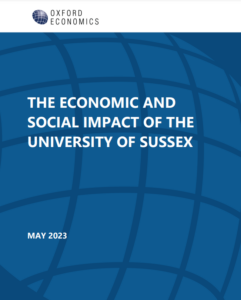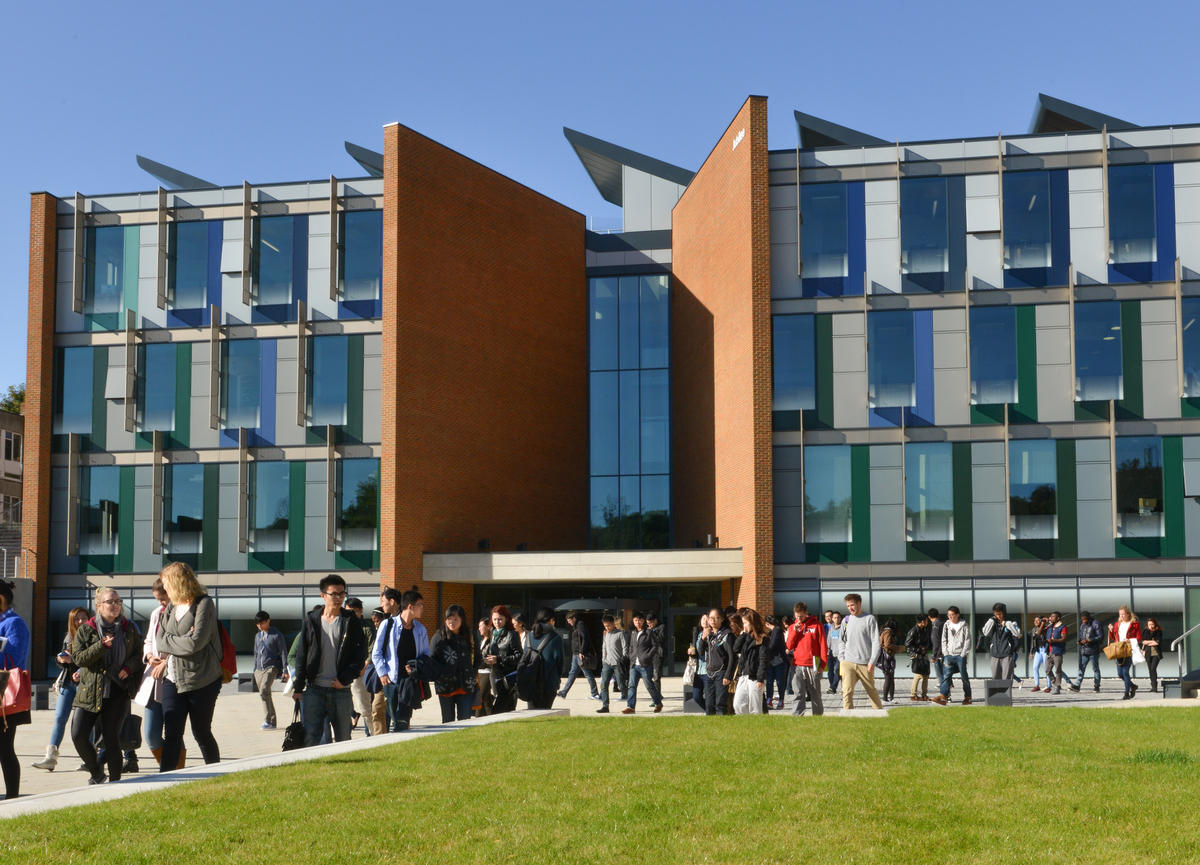Sussex University contributed £495 million in “added value” to the local economy in just one year, according to a study.
The university, based in Falmer, supported more than 7,800 jobs in 2020-21 – at the height of the coronavirus pandemic – and boosted hundreds of businesses, many of them local.
At the same time, academics at the university were carrying out world-class research in areas such as quantum physics and biochemistry, the study found.
Sussex commissioned Oxford Economics to produce an independent “economic impact report” to show the contribution made by the university to Brighton and Hove and the surrounding area.
The findings were presented to a meeting of the Greater Brighton Economic Board, at the AgriFood Centre, at Plumpton Agricultural College, today (Tuesday 18 July) by Sussex deputy pro-vice chancellor Debbie Keeling and director of innovation and business partnerships Sue Baxter.
The study measured the benefits of the university in several ways, including the effects of operational spending, the number of people employed and the number of other jobs supported by the university.
It also looked at the “gross value” and tax revenues generated from the university’s activities and the research and development spending in the region.
And it looked at the economic contribution made by students and the visitors attracted to the area by the university.
The Oxford Economics report said: “The University of Sussex is an important part of the economy of Greater Brighton.
“In 2020-21, the university made an estimated £428 million gross value added (GVA) contribution to Greater Brighton’s GDP (gross domestic product). This was almost 1.5 per cent of the total GDP of Greater Brighton.
“Some £207 million of this contribution was created by the university itself, with £75 million stimulated through supply chain and wage spending.
“The spending of students and visitors supported further contributions of £146 million and £1 million to GDP, respectively.
“The university supported 6,800 jobs in Greater Brighton, around one in every 80 jobs. The university itself sustained 2,830 of these jobs.
“Another 3,900 were supported off campus at Greater Brighton-based businesses. The majority of these, some 2,230 jobs, were stimulated by students’ subsistence spending.
“Across Greater Brighton, East Sussex and West Sussex, the university made a GVA contribution of £454 million and supported over 7,200 jobs.
“Its core economic impact on the UK economy is even larger, sustaining a £495 million gross value-added contribution to UK GDP, supporting more than 7,800 jobs across the country and generating a £114 million in tax receipts.”
There were wider effects too, the report said: “The university’s graduates enhance the skilled talent pool available to Greater Brighton, East Sussex and West Sussex employers.
“In the 2020-21 (2018-19) academic year, 7,147 (7,120) individuals graduated from the university.

“Over a quarter of the university’s 2018-19 graduates who were in-work were employed in Greater Brighton, East Sussex and West Sussex 15 months after graduation.
“Of these, 40 per cent were employed in ‘socially significant’ roles, including as teachers, social workers and doctors.”
The report also said: “The ‘Sussex 2025’ plan to boost entrepreneurialism has had a noticeable impact, with a rise in ‘Knowledge Exchange’ income, a jump in the number of graduate start-ups since 2018-19, and a doubling of employment in active spin-out businesses since 2017-18.
“During 2018-19 to 2020-21, there were five new academic-led spin outs, compared with only five in the previous two decades.
“In addition, there have been 37 graduate start-ups in the three years from 2018-19 to 2020-21, compared with only three in the preceding four years.
“The university is also supporting local businesses through newly appointed dedicated staff and programmes, as well as through the facilities and business services offered by Sussex Innovation.
“In 2020-2021, the university worked with a total of 440 businesses to help address their R&D (research and development) challenges and to provide companies with specialist services – with total commercial contract values from businesses amounting to approximately £6.3 million.
“In addition, the Sussex Innovation Centre helps firms with new products, notable market potential and entrepreneurial ambition.
“In 2020-21 (2018-19), the Centre offered more than 12,500 (12,100) hours of support to local SMEs (small and medium-size enterprises).”
The report added: “The university is also globally recognised for its research activity, with 89 per cent of the university’s research ranked as world-leading or internationally excellent.
“The university’s research income from commercial sources has grown to £10.3 million (£6.9 million) in 2020-21 (2018-19).
“This has cushioned the impact of the reduction in funds received from the European Commission in the same period.
“Given the uncertainty surrounding the future of the European Commission’s funding as well as the relatively static levels of funding from UK research councils and UK-based charities, attracting more funds from commercial sources will be vital to the university’s research activities.
“By developing new and improved products and processes, the university’s research activities foster innovation.”
Four new patents were granted to the university or those there in 2020-21 and five the year before.
The report also said: “(The university) collaborated with local firms by undertaking 341 (303) pieces of contract research worth £13.4 million (£12.7) million and 106 (85) pieces of consultancy worth another £3 million (£3.8) million in the same year.
“The University of Sussex has a strong presence in biomedicine and biochemistry. The REF for 2021 rated 92 per cent of the research in biological sciences as internationally excellent or higher, with 34 per cent rated as world leading.
“This area has the strongest industry collaboration out of all disciplines at Sussex. Spin outs and industrial partnerships add to the bio-innovation cluster within Greater Brighton, East Sussex and West Sussex.
“The university is also leading research in quantum technology with university projects in the field worth approximately £35 million and the university having the third most research groups exploring quantum technology.
“Around one third of live quantum technology projects are developed with an industrial partner. Therefore, the university is well positioned to lead the development of this disruptive technology.
“This technology could potentially bring economic benefits, including investment, to the local economy. In undertaking this research, the university has collaborated with 41 universities in 16 countries across the globe.
“The University of Sussex actively engages with the local community. It has been one of the largest partner organisations for both the Brighton Festival and Brighton Pride (both events have generated millions of pounds of business activity in the city).
“In addition, the Sussex Clinical Legal Education facility in the University’s Law department offers a variety of pro bono services to the local community.
“The university launched its Spirit of Sussex Award scheme for students in September 2020. This scheme offers a range of volunteering opportunities in the local community and, by August 2021, over 700 students were participating in the award scheme.
“The university also promotes the local economy to a global audience. It attracts students from more than 160 countries around the world.

“Students born outside of the UK accounted for 32 per cent of students during both 2020-21 and 2018-19 whereas individuals born outside of the UK accounted for 12 per cent (13 per cent) of Greater Brighton, East Sussex and West Sussex’s population.
“Some 63 per cent had returned to visit since graduating. They also serve as powerful ambassadors for the local area.
“Some 77 per cent of international alumni report that they have recommended visiting Greater Brighton, East Sussex and West Sussex to friends and family back home, and 90 per cent of those say that at least one person has visited on their recommendation.
“The university’s global networks could potentially be harnessed to help attract inward investment to the region.”
A similar report by Oxford Economics, published in 2018, estimated that the university added £407 million to the economy in 2015-16, including £343 million to the local economy in Brighton and Hove and the surrounding Sussex area.
To read the report in full, click here.









